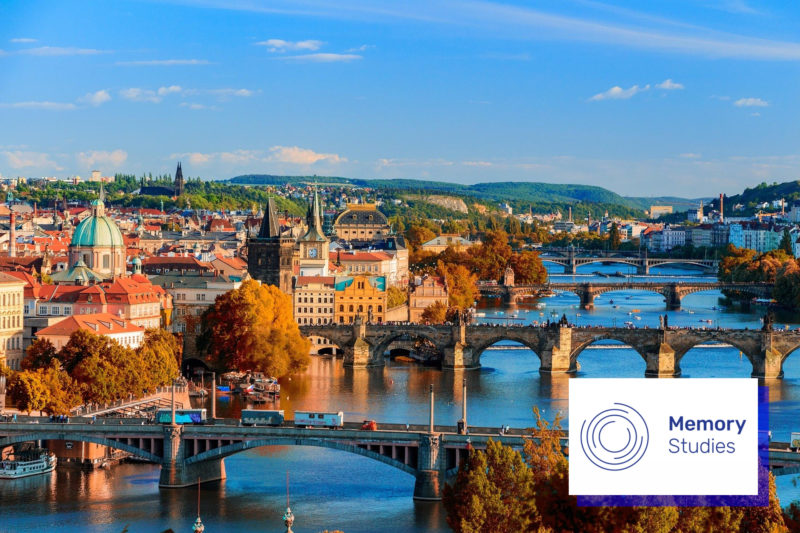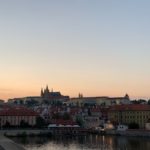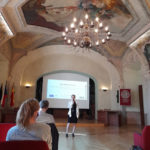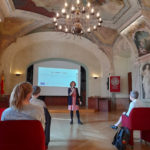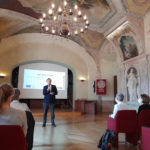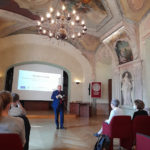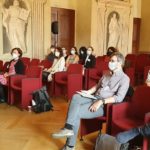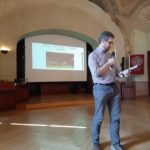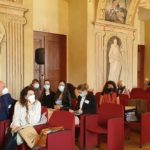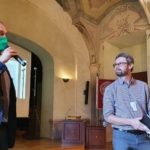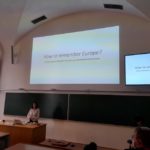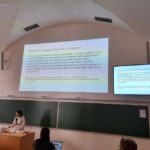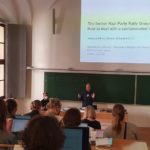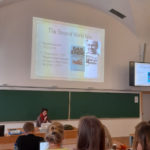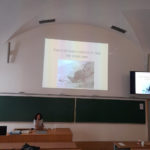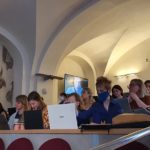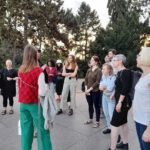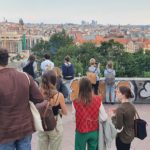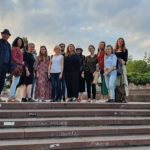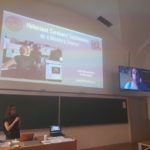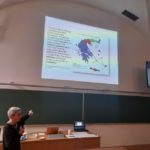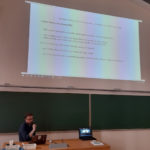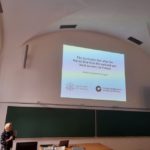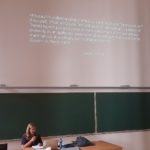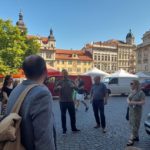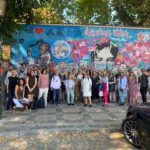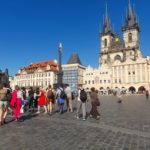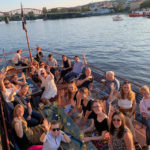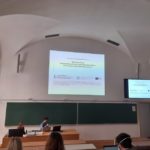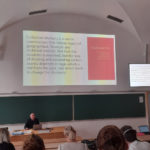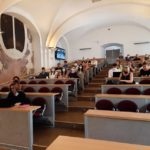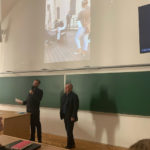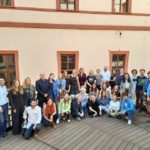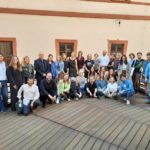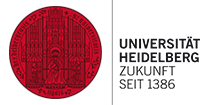-
Summer School: Nationalism, Religion & Violence in Europe
-
-

- 06-09-2021
-
-
-
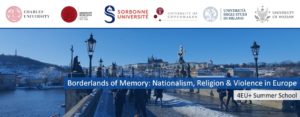 4EU+ Summer School: Borderlands of Memory. Nationalism, Religion & Violence in EuropeThe second 4EU+ Plurality of Memories in Global Perspective Summer School – Borderlands of Memory: Nationalism, Religion & Violence in Europe took place in Prague, Czechia during the first week of September 2021 (6-10.09.21). Organized by the 4EU+ University Alliance (incl. University of Warsaw, Sorbonne University, Charles University, Heidelberg University, Milano University and Copenhagen University), the Summer School managed to bring together Ph.D. and advanced M.A. students from diverse disciplinary backgrounds alongside established experts in the memory field. The purpose of the Summer School was to grasp and then analyze different dimensions of memory in the borderlands, thus the study sessions were split into thematic blocs, among them: places-experiences, memory beyond “history,” marginalized memories and memory transdisciplinary.
4EU+ Summer School: Borderlands of Memory. Nationalism, Religion & Violence in EuropeThe second 4EU+ Plurality of Memories in Global Perspective Summer School – Borderlands of Memory: Nationalism, Religion & Violence in Europe took place in Prague, Czechia during the first week of September 2021 (6-10.09.21). Organized by the 4EU+ University Alliance (incl. University of Warsaw, Sorbonne University, Charles University, Heidelberg University, Milano University and Copenhagen University), the Summer School managed to bring together Ph.D. and advanced M.A. students from diverse disciplinary backgrounds alongside established experts in the memory field. The purpose of the Summer School was to grasp and then analyze different dimensions of memory in the borderlands, thus the study sessions were split into thematic blocs, among them: places-experiences, memory beyond “history,” marginalized memories and memory transdisciplinary.The program of the Summer School kickstarted with intriguing and gripping keynote speech by prof. Michal Frankl, an intense week of interactive seminars and hands-on workshops, led by professors from partner universities, and a cherry on top – Prague memory sites walk.
“Overall, I found the program to be very interesting with a nice variety of topics and interesting connections to memory studies within many different disciplines. Generally, the structure of 2-3 sessions per day seemed very good and the lengths of the lectures were good as well. There were a few sessions that I wish had been longer…” – comments Grace Coleman, Charles University.
“I enjoyed the Summer School very much. It was well organized; the participants were all very qualified. I found the balance between lectures and free exchange, professionalism and friendly interaction particularly successful.” – says Anna Loscher, M.A., Heidelberg University
Based on the feedback received from both students and experts, the Summer School was a reckoning success. It was, moreover, one of the first offline events many could attend following the outbreak of the COVID-19 pandemic. The diverse and competitive program attracted some 30 students from 6 different universities.
“I really enjoyed Summer School, not only because of lecturers that were really interesting, but also because of the people and great atmosphere. I found it really valuable, because we could share our cultural experiences also in the field of memory studies.” – adds Anna Skiba from Warsaw University
The Summer School enabled its participants to analyze and discuss several important memory and history-related issues; cooperate with experts from a wide range of Dields, (including history, political and cultural studies, literature, anthropology and performative arts.)
“I was really impressed by the presentations and the way the summer school was structured. I learned a lot of new perspectives on memory studies and how it isn’t limited but is relevant across disciplines.” – notes Sophie Amalie Stausholm, University of Copenhagen
By the end of the school, the student participants did not only explore multiple dimensions of memory in the borderlands, but also were able to bridge the past with the present. Finally, the summer school was a unique opportunity for young academics to widen their professional network and perhaps, cooperate on joint research projects in the future.
“I think this Summer School was actually a good experience that allowed me to enlarge the network of my contacts with academicians and I got very useful and interesting hints about topics related to my research.” – recalls Giovanni Agostoni, University of Milan.
NRVSS 2021 ACADEMIC PROGRAM AND SCHEDULE
Monday, September 6: PLACES – EXPERIENCES
9:00-9:30 Jiří Kocián (CUNI) Introduction to the premises and Summer School practicalities
9:30-10:00 OfEicial Welcoming – Prof. Lenka Rovná (CUNI, Vice-Rector, Institute of International Studies), Prof. Jan Hajič (CUNI, Institute of Formal and Applied Linguistics, LINDAT/CLARIAH-CZ), Dr. Nicolas Maslowski (UW, Head of the 4EU+ European Pluralities Consortium)
10:00-11:30 Keynote speaker – Michal Frankl (Masaryk Institute and Archive, Czech Academy of Sciences), Refugees in the No Man’s Land at Czechoslovak Borders in 1938
12:30-14:00 Jessica Ortner (UC), How to remember Europe? German Jewish Migrant Literature as a Battlefield of Memories
14:15-16:45 Thomas Schmitt and Jonas Lendl (UH), The former Nazi Party Rally Grounds in Nuremberg: How to deal with a contaminated urban landscape?
17:00-18:30 Evening BanquetTuesday, September 7: MEMORY BEYOND “HISTORY”
10:00-11:30 Aleksandra Wiktorowska (UW), Memory of War and Literary Journalism: the Cases of Spanish Civil War, the Second World War, and Balkans War
12:30-14:00 Maurizio Guerri (UM), The “operational images” in Harun Farocki’s works14:15-16:00 Luba Jurgenson (Sorbonne), Traces of mass violence in (on) the landscape
Wednesday, September 8: MEMORIES AND COUNTER-MEMORIES OF SURVIVAL
10:00-11:30 Kateřina Králová, Jakub Mlynář and Karin Hofmeisterová (CUNI), Holocaust Survivors Testimonies as a Memory Source (PART I)
12:30-14:00 Kateřina Králová, Jakub Mlynář and Karin Hofmeisterová (CUNI), Holocaust Survivors Testimonies as a Memory Source (PART II) Hands-on Seminar14:15-16:00 Paweł Dobrosielski (UW), Nationalistic discourse on the Polish-Jewish relations in contemporary Poland
Thursday, September 9: MARGINALIZED MEMORIES
10:00-11:30 Małgorzata Głowacka-Grajper (UW), The territories lost after the World War II in the national and local memory in Poland
12:30-14:00 Silvia Riva (UM), Europe and “minor” genocides. Memory and reparation through recent writings and political discourse in the French-speaking contexts14:15-17:00 Field trip, Prague Memory Sites
Friday, September 10: MEMORY TRANSDISCIPLINARY
10:00-11:30 Elisabetta Modena and Giancarlo Grossi (UM), The Virtual Truth: Ideological Implications and Witnessing Effect in Immersive Journalism Experiences
12:30-14:00 Concluding keynote – Nicolas Maslowski (UW), Memory in the International Relations14:15-15:00 Certificate Awarding


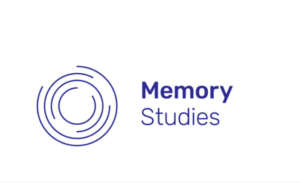
- Prague
- Day 1. Official Welcoming
- Day 1. Official Welcoming
- Day 1. Official Welcoming
- Day 1. Official Welcoming
- Day 1. Official Welcoming
- Day 1. Keynote Speaker
- Day 1. Keynote Speaker
- Day 1. Keynote Speaker
- Day 1. Lecture
- Day 1. Lecture
- Day 1. Lecture
- Day 2. Lecture
- Day 2. Lecture
- Day 2. Lecture
- Day 3. Lecture
- Day 3. Lecture
- Day 3. Lecture
- Day 4. Lecture
- Day 4. Lecture
- Day 5. Lecture
- Day 5. Lecture
- Day 5. Certificates
- Day 5. Certificates
- Day 5. Certificates
- Day 5. Certificates
-
-
